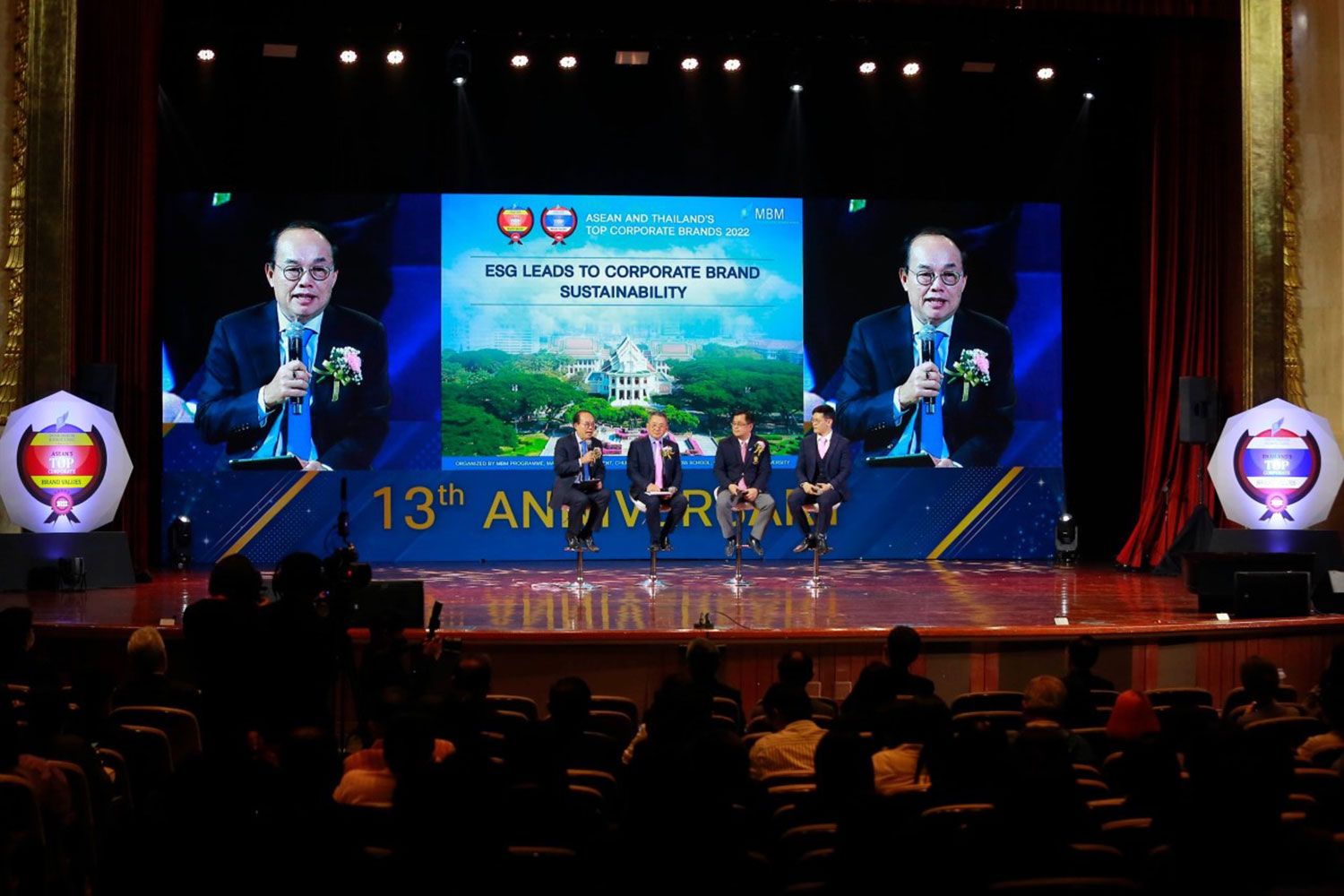
In an ever-changing world, business models with Environment, Social and Governance (ESG) concerns have become a global mega trend. Chulalongkorn Business School (CBS) therefore recently organised a seminar to convey perspectives on how to incorporate ESG into branding and marketing efforts.
As part of ASEAN and Thailand's Top Corporate Brands 2022 awards presentation, CBS hosted a seminar entitled "ESG Leads to Corporate Brand Sustainability" offering the audience a chance to learn more about the role ESG plays in brand strategy. Assoc. Prof. Dr. Wilert Puriwat, Dean of Chulalongkorn Business School (CBS); Adjunct Prof. Kitipong Urapeepatanapong, Chairman of Thai Institute of Directors (IOD); and Vasit Taepaisitphongse, Chief Executive Officer and President of Betagro Public Company Limited, joined the panel to share ideas and experiences and exchange perspectives as well as provide tips on how to use ESG as a corporate strategy for brand sustainability.
Dr. Wilert said that, “Doing businesses under the ESG framework is not about costs but a tool to increase the competitive edge. Corporate brand value is the power of a brand to attract customers but no longer comes entirely from functional value. Companies must empower brands with ESG because sustainability doesn’t only come from the quality of products. Most Thai companies are on par with ESG criteria, so the question is the level to which Thai companies can undertake ESG on top of a set of standards.”
"No matter how the world is changing and how technology disruption affects companies, goodness, ethics and integrity remain at the core of doing business according to the principles of economic, social and environmental responsibility," he noted.
Dr. Wilert underlined that, “Brand building is a long-term practice. When businesses are facing changing ecosystems, they must engage in the next context. Large or small enterprises can apply the ESG framework because it is a fundamental principle for people to live in this world. ESG doesn’t have to be a typical practice; rather each company should adopt its own ESG strategy to create uniqueness.”
“Thus, ESG strategy isn’t just about commitment but is a core value that connects the corporate brand to the world, to consumers. When choosing products, customers today also look for value
in the brand. If ESG is embedded in their products and services, corporate brands will successfully reach out to customers. It is a strategy to develop corporate brand sustainability.”
Adjunct Prof. Kitipong Urapeepatanapong, Chairman of the Thai Institute of Directors (IOD), commented that, “It is a must for all enterprises to do business according to ESG principles, and do this immediately, so as to comply with local and international regulations.” He noted that the Stock Exchange of Thailand has adopted sustainability as a key index to measure the corporate governance reports (CGR) of Thai listed companies.
“Today, while Thai society is paying greater attention to the ‘E’ (Environment) in ESG and is aware of the need to mitigate carbon footprints, insufficient attention is given to the ‘S’ (Social) despite rising social issues, including labour shortage, higher household debt as well as the growing number of senior citizens,” Prof. Kitipong continued.
“Moreover, young consumers, or Gen Z, will prefer companies that have adopted ESG effectively. They will pay attention to the production process and raw materials and finally look at the future impact on how they will live in this world.”
Prof. Kitipong further commented that, “Implementing ESG is not charity but an imperative that all organisations must actively apply. Companies must promote employee engagement to create a new corporate culture that ensures ESG will be incorporated into employee benefits.
Nonetheless, knowledge is the key that will drive companies to develop ESG strategy. Currently, the SET and IOD are accelerating the design of ESG 101 for top executives and business owners to learn about ESG which will lead to more adoption.”
Vasit Taepaisitphongse, Chief Executive Officer and President of Betagro Public Company Limited, pointed out ways to incorporate ESG into corporate strategy. “Firstly, the company must be committed to the obvious purpose of what, why and for whom it is doing business and to setting a long-term plan for sustainability,” he said. “Secondly, doing good business must be part of the ecosystem. The sustainable brand will be based on business ethics. This is very important. It must first be done from inside before looking outside as to how we can deliver good things to business partners and society.”
Vasit suggested that each company develops a materiality matrix to identify and prioritise what matters most to the business and its stakeholders in terms of positive and negative impacts because not everything the company does will be relevant to sustainability.
For Betagro, the most material issues include climate change, food security, and food transparency.
This year, Thailand's Top Corporate Brands saw two newcomers being recognised – Asset World Corporation Public Company Limited, a subsidiary of TCC Group, won in the property industry while the award in the medical sector went to Bangkok Chain Hospital Public Company Limited. With a brand value of $22.928 million (767,669 million baht as per foreign exchange rate as of 30 December 2022, Airports of Thailand remains the only listed company in Thailand to win ASEAN’s Top Corporate Brand 2022 for five consecutive years.

